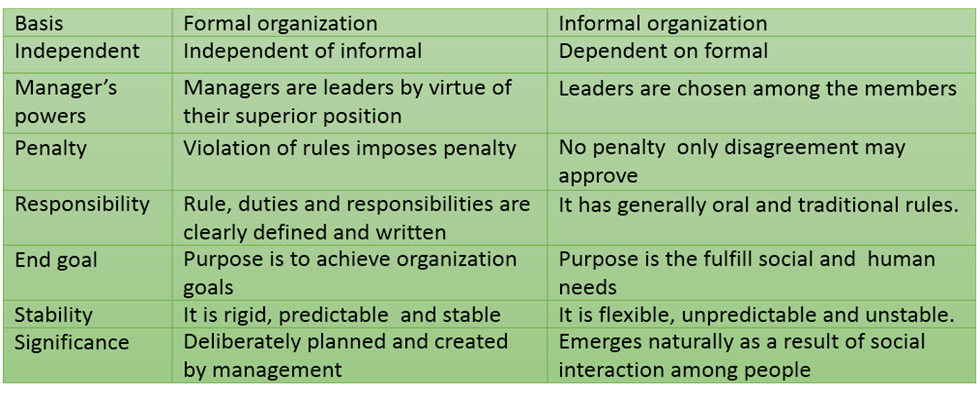- Books Name
- BUSINESS STUDIES-XII
- Publication
- ABCD CLASSES
- Course
- CBSE Class 12
- Subject
- Business Studies
FORMAL ORGANISATION
Deliberately Planned By the Top Management to Achieve the Specified Objectives Through the Network of Authority Responsibility Relationship
Features
- Created deliberately by management.
- Results in the creation of a scalar chain.
- Extra emphasis on work than on interpersonal relationships among employees.
- Assigned a specific job to each individual and a fixed authority.
- Motives to organizational goals.
Advantages:
- Avoid duplication of effort as each member knows their duties.
- Responsibility can be fixed due to well established authority responsibility relationship
- Establish unity of command through a chain of command.
- Accomplishment of goals by providing a structure where each employee knows their role
- Stability to the organization by well-defined job and ensure growth and survival
Limitations:
- Talent and creativity of worker is reduced due to rigid policies
- Rigid structures do not allow deviation due to fixed roles assigned to employees
- Inter-personal relationship gaps between persons issuing orders and subordinates following orders
- Procedural delays increase the time taken for urgent decision-making.
INFORMAL ORGANISATION
Informal Organization: -Complex network of social relationships which appear unexpectedly to fulfill social and human needs. Features
- Created automatically without any purposeful efforts by the management.
- Originates from within the formal organization as a result of personal interactions among employees.
- Does not follow any fixed path of authority.
- Employee's behavior is based on convenience with no definite structure.
Advantages:
- Fast:-Information travels very fast as there is no procedural and language barrier
- Add flexibility: - Serves the purpose not fulfilled by the formal organization.
- Social needs of the members are fulfilled and give them a sense of belongingness in the organization.
- Timely feedback Prescribed lines of communication are not followed and quick feedback gets from informal channels.
Disadvantages:
- Opposition The management may not be successful in implementing changes if the informal organization opposes them.
- Promotes groups: - Compels members to agree with the group expectations. This can be harmful if the rule set by the group are against organizational interests.
- Spread rumors: - Due to the fast flow of information it can spread rumors which may work against the goodwill of the formal organization


 ABCD CLASSES
ABCD CLASSES
